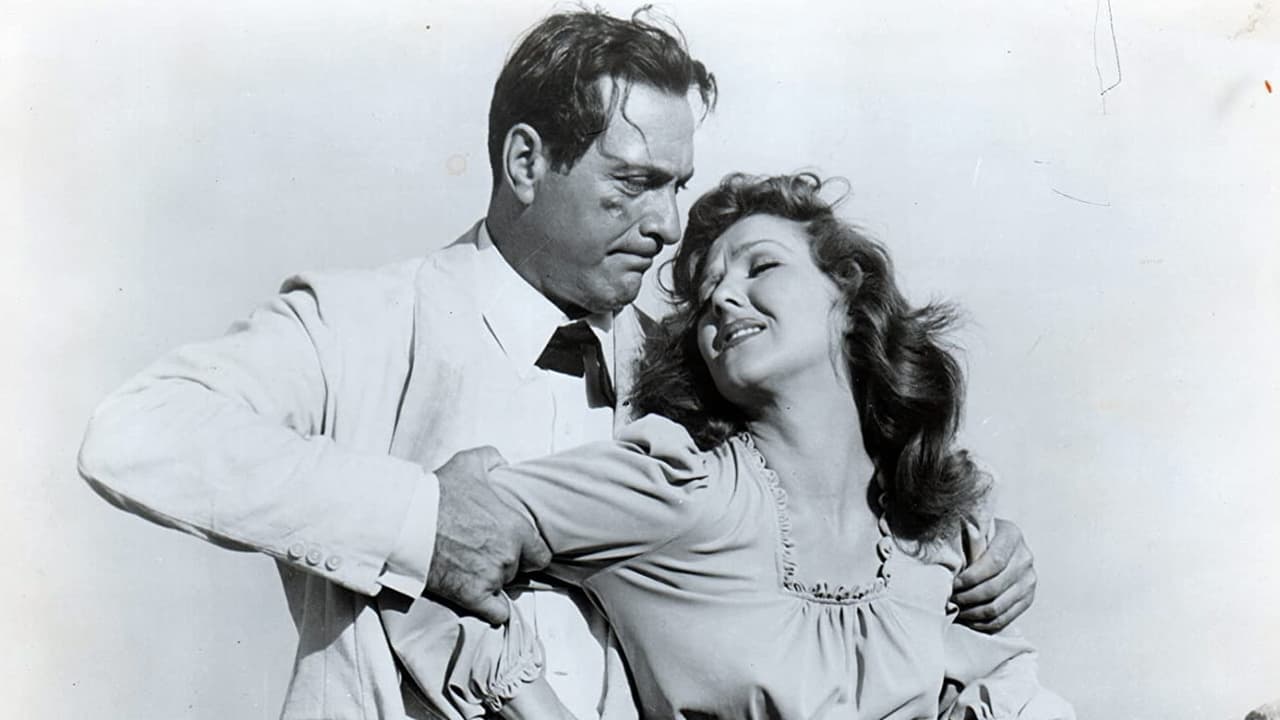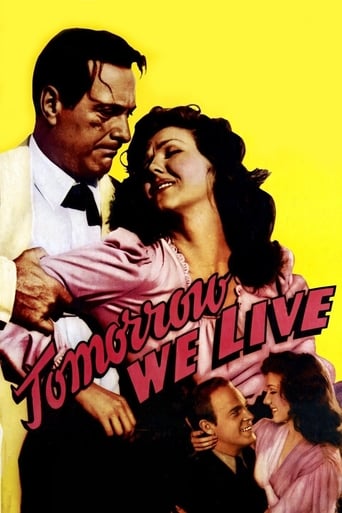



Plot so thin, it passes unnoticed.
Instant Favorite.
good back-story, and good acting
It is interesting even when nothing much happens, which is for most of its 3-hour running time. Read full review
View More***SPOILERS*** Former screen Latin lover with a tough New York City accent Ricardo Cortez plays big time hood Alexander Casear Martin who's nicknamed The Ghost. Martin got a racket going in the middle of the Arizona Desert storing used tires and selling them for a profit in the black market. This while his country the USA is involved in a life and death struggle with the forces of fascism around the world. Known as the Ghost because he survived two assassination attempts Martin is told by his doctors that he doesn't have long to live so he lives dangerously by throwing his weight around at rival gangsters one being Big Charlie who's trying to muscle into his black market racket.As we soon find out Martin uses Pop Bronson's, Emmett Lynn, diner called the "Busy Bee" as the center of his criminal operations. It's Pop's daughter Julie, Jean Parker, who's just back from collage, which she dropped out of, who smells a rat in her dad's relationship with Martin and want him to discontinue it. There's also Julie's former boyfriend now an officer in the US Army Let. Bob Lord, William Marshall, who wants to rekindle his love affair with her who's now stationed in an army camp not far from Pop's diner. It's doesn't take long for the womanizing Martin to start to work on Julie whom he met at his night club "The Dunes" where she went to have a few drinks and party. All throughout the rest of the movie Marin's obsession with Julie blinds him from what Big Charlie is planning for him. Julie soon finds out why her father Pop is so deeply involved with Martin in that he's been blackmailing him for the last eight years. That in Pop being a wanted fugitive from the law in a jail break he was involved in where three people were killed.***SPOILERS*** The film seems to try to equate Alexander Caesar "the Ghost" Martin with fascists dictators like Hitler and Togo whom the USA at the time, 1942, was at war with. That seems to be the reason that Julie's boyfriend is a member of the US Military slated for the Pacific Theater of War to battle it out with the fascist Japanese Empire as well as doing battle against Martin and his hoods back home. Still as hard as it tries the movie falls flat on its face in trying to do that. Even the reality challenged Martin finds it all ridicules in a backwards sort of way when he's compared to Adolph Hitler by Bob Lord. That in Martin feeling that Hiter is nothing but a two bit hood who at the time controlled almost all of Europe not a successful mob boss like himself who only controls, and is in danger of losing it, a small patch of land in the middle of the Arizona Desert.The best part in the movie is saved for the last when after being worked over by Big Charlie's men Martin ends up in the middle of the desert hitchhiking his way to Pop's diner, with Pop 's daughter Julie giving him a lift, where he ends up completely losing it. Finally realizing that his criminal empire is history Martin suddenly goes nuts or wacko with a fatally wounded Pop Bronson, whom Martin had just gunned down, putting him out of his both madness as well as misery with a bullet to his gut.
View MoreRicardo Cortez and Jean Parker horrible copy from Alpha--way too dark and blurry 2 Samuel 1:27 says "How the mighty have fallen" and this is an often quoted phrase. In the case of Ricardo Cortez and "Tomorrow We Live", it is very fitting. That's because in the early part of his career, Cortez was a hot commodity in Hollywood--having starred in such notable films as the first "Maltese Falcon" in 1931 and receiving top billing over Greta Garbo in "Torrent" in 1926. However, his career never really reached the heights after this and his career was a very slow downward spiral--resulting, by 1942, in him starring in some very low-budget B-movies. As for Cortez, this actually turned out to be a blessing, as he soon retired and moved into a Wall Street job and made a small fortune! So, although his career had definitely fallen by the 40s, it all worked out well for everyone--everyone except for audiences hoping to see him in good films! As "Tomorrow We Live" began, I cursed myself for watching this Alpha Video copy. That's because Alpha never restores their DVDs at all--and often they use the lousiest of prints. And, in the case of this movie, the print is horrible! It's very blurry and dark--and looks really ugly.The film begins with a racketeer (according to one astute reviewer, Ricardo Cortez's character was based on Bugsy Siegal) noticing a nice young lady (Jean Parker). While she isn't interested (since she is a nice girl and already has a boyfriend who is in the service), Cortez isn't about to take no for an answer. Additionally, Cortez has a hold over her father--but exactly what it is the audience doesn't know. All this eventually leads to murder and a VERY heavy-handed message that equates gangsters to the fight against international fascism.So why do I give this film only a 3? Well, two main reasons. First, the message lacks subtlety and is never handled gracefully or deftly. Second, and more importantly, Cortez's character has a HUGE meltdown at the end that just comes off as silly and unbelievable. Could this movie have been better? Of course, but based on the limp plot you couldn't have done much more with this picture.
View MoreThis could be called "The Petrified Nightclub" for the ridiculous story it presents of a dying criminal (Ricardo Cortez) who hides out in the desert, yet has built up a popular hot spot that locals from every nearby metropolis (Deadwood, Cactus Creek, you get my drift) visit. He gets a hankering for pretty Jean Parker, a socialite visiting her father whom Cortez is blackmailing for crimes he has not paid for. Cortez is determined to possess Parker, yet she is already involved with another man (William Marshall). It seems that Cortez thinks he has a right to have the woman he wants under his dying circumstances, and with some very bad acting, he goes about getting her no matter what. Even at 62 minutes long, this film (directed by the usually brilliant "Z" Grade director Edgar G. Ullmer) is hideous.
View MoreAfter an opening sequence featuring stock footage so dark and dupey that its difficult to tell what we're seeing, the film proper begins (and lightens up to acceptable visual quality) and moves into Pop Bronson's (Emmett Lynn) desert diner. We find Pop in mid-conversation with his daughter Julie (Jean Parker, who also starred in Ulmer's BLUEBEARD) who has just dropped out of college. Pop has been sending her money for years to put her through school and he's understandably upset about her sudden, inexplicable dropout. The scene is deliberately disorienting, as it takes a while before we understand the context of their conversation. When Julie accuses her father of black marketeering (this is war time, after all), Pop gives her a vicious slap. The whole scene prepares us for an unsettling experience which the film does not deliver until it's more than half over, settling in to long soap opera conversations filmed in uninteresting master shots. We meet Ricardo Cortez, gangster owner of a desert night club, who has earned the moniker of "The Ghost" for his survival of two attempts on his life. Thirty-five minutes into this barely 63 minute movie, the guns start blazing, the camera begins to move and the editor wakes up. Julie's Army boyfriend shows up to give The Ghost a major dressing-down, comparing him to Hitler and warning him that the honest little people will soon beat his pants off. Instead of the little people, its a rival gangster who beats The Ghost nearly to death and burns down his club, driving the man mad. The film now races to a speedy, suspenseful conclusion. In his career-spanning interview with Peter Bogdanovich Ulmer described this as a horror film influenced by Grand Guignol (which it is not), but its opening scene, final 30 minutes, odd patriotic imagery and good performances from Cortez and Parker make it worth seeing for anyone interested in Ulmer's career of making something out of nothing.
View More